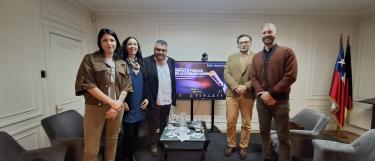
“The Public Impact of Communication”: Kick-off of the International Diploma in Public Communication
How is public space configured in the era of social media? What does ethical communication management entail? Who defines what is of public interest and what is not? How do we navigate the ecosystem of generative AI, with its vast amount of information and incredible rhetorical capacity?
The Heidelberg Center for Ibero-American Studies (HCIAS) of Heidelberg University and the Faculty of Communication and Image of the University of Chile launched the third edition of the International Diploma in Public Communication (DICP) with a roundtable titled "The Public Impact of Communication." The roundtable featured Professor Diana Aurenque, philosopher, researcher, and science communicator; Professor Lionel Brossi, expert in ethics, digital communication, and artificial intelligence; Carolina Mosso, Head of Communications at the Municipality of Renca; and Patricio López, Director of Radio Universidad de Chile. The discussion was moderated by Professor José Miguel Labrín, academic at the Faculty of Communication and Image.
For the participants, public space and journalists' responsibility must be defined by ethical management and awareness of the impact of their work. Journalists should step down from the pulpit and stop speaking in absolutes, being conscious of the real relevance of what is being published and how information is replicated from channel to channel. The multiplying factor of social media contributes to dangerous misinformation, exacerbated by the intervention of artificial intelligence, establishing as a sine qua non condition that what is disseminated and published must be genuinely useful and contribute to the civic life of the recipients.
The International Diploma in Public Communication is a program aimed at training professionals in the analysis and management of public communication, emphasizing the role it plays in shaping and creating meaning. In the third edition of the DICP, 25 communication professionals will be trained, bringing the total number of participants to nearly 80 since the program's implementation in the fall of 2022. This program is part of the continuing education catalog of the Heidelberg Center for Latin America and is supported by the German Academic Exchange Service (DAAD).